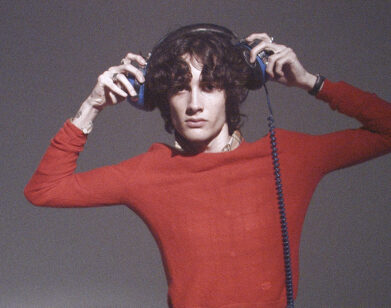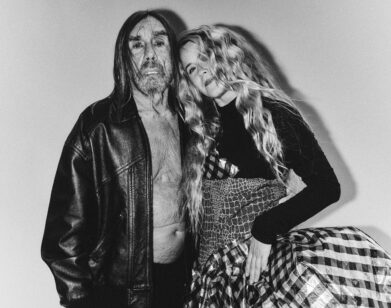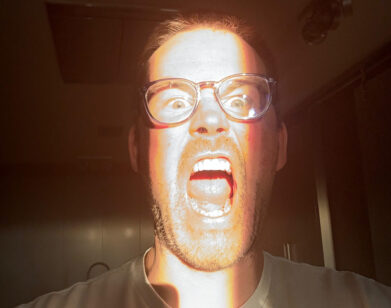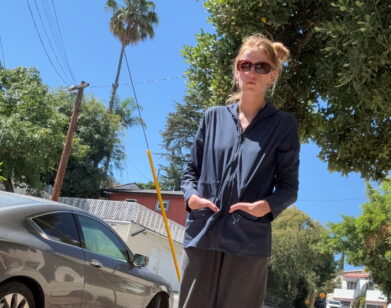tUnE-yArDs are Marching to a New Beat
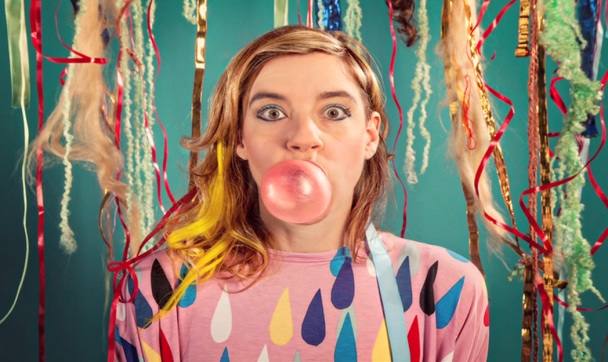
ABOVE: TUNE-YARDS’ MERRILL GARBUS
The opening minute of tUnE-yArDs’ Nikki Nack finds Merrill Garbus boldly encouraging us to “Find a New Way.” The lead track, which almost became the album’s title, begins with cascading synthesizer scales. In the background, a rumbling drum machine smacks to a halt before doubling back. Accompanied by Garbus’s androgynous wail and jam-packed lyrics, the song is unmistakably tUnE-yArDs’, but it’s also far removed from anything the band has done to date. It’s the sound of a band heeding its own advice.
Following the success of 2011’s breakthrough album w h o k i l l, tUnE-yArDs returned home to Oakland, CA as critical darlings. But after nearly two years of touring, the band needed some healing time. For Garbus, that meant a re-education of sorts; she enrolled in vocal lessons, took up Haitian drumming and dance, and exchanged her calling card loop pedal for a drum machine. Armed with an arsenal of new tools, she and bassist Nate Brenner headed into the studio to begin crafting Nikki Nack, a frenetic, slanted, and bizarrely catchy album that turns the notion of “dance music” on its head. Like past tUnE-yArDs records, Nikki Nack thrives on the unexpected; tempos shift in a second’s notice, drums burst open in a way that’s both visceral and exacting. Meanwhile, Garbus’ imaginative narratives of struggle and empowerment get belted louder than ever. The only thing is now, they also groove.
In the weeks leading up to Nikki Nack‘s release, tUnE-yArDs hit the road as the opening act for Arcade Fire’s traveling-circus-meets-musical tour. We spoke to Garbus during a night off in Nashville, TN, about going digital, returning to the dance studio, and the inspirational genius of Pee Wee’s Playhouse.
ALY COMINGORE: How have the Arcade Fire shows been going?
MERRILL GARBUS: Oh, it’s totally awesome.
COMINGORE: I bet.
GARBUS: Yeah, it’s a little bit like a fantasy land. This is a new band, and we have some band members who haven’t really done this type of touring before. I keep telling them, “This is not reality. We don’t have people cooking us lunch and dinner. There’s no open salad bar at all hours.” But they’ve been extremely nice to us. And there have been really sweet crowds of people, especially on the floor, who are super positive, and also so extremely excited about the show that they’re about to see. They’re in their dress-up clothes. It’s really sweet.
COMINGORE: The thing that immediately struck me about the new album was just how digital-embracing it sounds. What pushed you in that direction?
GARBUS: There were lots of things, not the least of which was that I was just really bored with myself. I’m really proud of those songs from the last record, and from the first record too, but I think there’s a fatigue that happens. It’s like, “Okay, I’ve heard my voice sing this way, I’ve heard these rhythms.” The looping pedal is a wonderful tool, but it has its limitations. I think the rhythmic influences that I had been working with felt limited, too. I feel like I have a nuanced sense of rhythm and I was ready to really push that. I felt like there was a lot more that I could do musically, but I wasn’t sure what that was.
COMINGORE: So you basically scrapped your process.
GARBUS: Yeah, kind of.
COMINGORE: As far as songwriting goes, where did you start?
GARBUS: Usually with some fragment of something. I’m thinking, because a lot of these songs started in a lot of different ways, but most of it was musical scraps, like, here’s this little experiment I did on the iPad, and here’s this thing that I hummed to myself when we were in the Netherlands in 2012. They were these little tiny bits that started small and kind of snowballed from there. I did a lot of work this time with drum machines. It’s not romantic to say it, but I started on the iPad a lot. The GargageBand app is extremely powerful and extremely fun, and I think that inspired me to go in more of a dance music-leaning direction. I also feel pretty frustrated at times with what is considered dance music, so I really felt like there was a huge challenge there that I was ready to meet.
COMINGORE: What is it that’s unromantic about songwriting with an app? I feel like artists have an aversion to talking about it, but in theory it’s this really amazing tool.
GARBUS: Yeah, and it jives with the populist part of me in that everyone can do it. I love that sense that music is so accessible to people these days and in these ways. But then you have to start thinking about what is it that makes my job my job versus something that anybody could do. And that’s a good question. I think a lot of musicians should ask themselves that question.
COMINGORE: How do you answer it?
GARBUS: For me, it’s in the juxtaposition of things. It’s not just using a metronome and a computer program to make the song. It’s almost like, all of the songs already exist in the universe, so how do I make my music and filter it through me so that it comes out on the other end feeling like something that no other person could have made? A lot of these songs are collaborations, too. Most of them are me and Nate, who’s been steadily becoming more of my writing partner in pretty subtle ways. He can almost read my mind before I know what I want in terms of bass lines, but also song arrangements. Then there are these producers that we brought in for a couple songs, and there are the musicians who played on the record. I think that’s what makes a band special or makes a music project special—it’s everything else besides the drum machines, which is awesome.
COMINGORE: You mentioned wanting to make a dance record. You also took dance lessons.
GARBUS: Yeah, mostly Haitian folkloric dance. That was how I started learning Haitian drumming, too. I was actually looking at videos of those classes today and really missing it. It’s really, really powerful stuff. It takes a lot of physical strength, but it also comes directly from the incredible history of that country, and that to me just made it so much more of an experience. It wasn’t just, “Oh, I’ll go to dance class and learn modern dance steps or get physically toned.” It was about accessing something very deep and human inside of me and dancing from there, and that was really wonderful.
COMINGORE: What initially sparked the interest?
GARBUS: Literally it was just something on my list: “Take dance classes.” A friend of ours is a drummer and had been drumming for this dance class. I had done West African dance and Caribbean dance and I always really loved it, but dancing is so… I don’t know. I was turned off of being a dancer when I was a kid because we moved to this suburban, very wealthy town in Connecticut and it was mostly just real skinny blonde girls who I didn’t feel I could match in the dance arena. Suddenly dancing became ballet and for pretty, elegant, lovely girls, and I didn’t feel that way. I kind of feel like I’m making up for lost time in that way. Now I feel like dancing is for strong bodies; you are down low and you are jumping, but most importantly landing on very strong legs.
COMINGORE: There’s this childlike quality running throughout the record, which plays out so wonderfully in the video for “Water Fountain” [above]. I watched it the other day and I’m not going to lie, it struck a weird emotional nerve.
GARBUS: Ha! Good! In going back to things that inspired me, I definitely went back to Pee Wee’s Playhouse this time around. All of a sudden I was seeing these brighter colors, a lot like what the album cover looks like now. It was kind of like I needed to see in Technicolor versus muted colors, and one of the first things I thought of was Pee Wee’s Playhouse, where it’s just so vibrant and overwhelming in a sensory way. What I really wanted for the video was to be the host of a kids’ show, and [director] Joel [Kefali] totally got on the vibe with me. He’s from New Zealand, so he had all these New Zealander references for kids’ shows. And we went back to Sesame Street and different animations from programs that I knew. But I could not have dreamt up what he came up with. It was just totally awesome.
COMINGORE: Do you feel like there’s an overarching theme to Nikki Nack?
GARBUS: You know, my perfectionist self thinks that I should have had a theme. I should have started with it and ended with it. I should have had a thesis! But I feel like the seed was syncopation. That was kind of where I started from. Knowing that syncopation was already something that I was doing a lot, I wanted to figure out why I liked it and what I liked about it and what other types of rhythm I could bring into that. But man, it was just a maze after that. I like that the album doesn’t feel so contained, though. When I listen to w h o k i l l now I think I was really trying to shove things into an album that made sense. On this one I felt lost a lot of the time, and I think that allowed the songs to do what they needed to do. That’s why Nikki Nack felt like such a good title. It’s a woman’s name and she’s her own beast. She’s going to do what she wants to do, and that’s definitely how I felt at the end of making it.
NIKKI NACK IS OUT TODAY VIA 4AD. FOR MORE ON THE BAND, PLEASE VISIT ITS WEBSITE.

